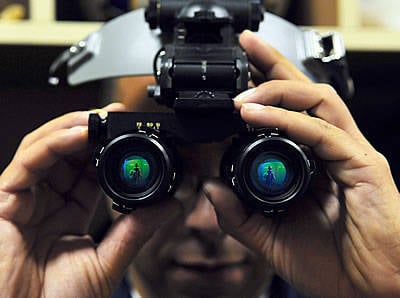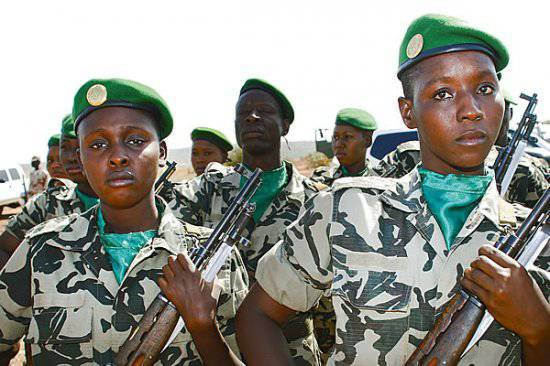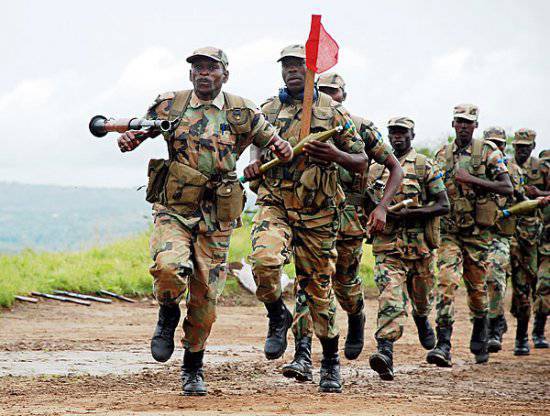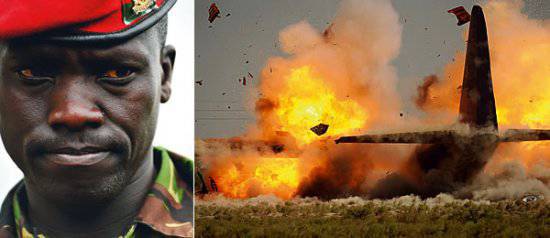State Corruption
 In dirty deals on the market weapons implicated power structures leading democracies of the world
In dirty deals on the market weapons implicated power structures leading democracies of the worldIn the spring of 2008, a number of publications appeared in the prestigious American newspaper The New York Times, which led to a very unsightly corruption scandal involving the supply of arms and ammunition to Afghanistan. The fact that these publications became publicly available testifies, apparently, that people and companies involved in the scandal acted so brazenly and cynically that no one considered them to be a cover. However, this scandal - only the tip of the iceberg called the arms market, which in the past two decades has become one of the most corrupt areas of foreign trade.
In the summer of 2008, The New York Times published material on the results of the investigation regarding the US ambassador to Albania, John Withers, who was accused of covering up the deal on the illegal supply of ammunition to Afghanistan.
OPERATION "ALBANIAN"
A reporter for The New York Times had information that the contractor, who was purchasing ammunition in Albania, was playing a foul play, and asked for permission to inspect the warehouses where the cartridges were kept prepared for shipment to Kabul. This was not denied to him, but Albania’s Minister of Defense Fatmir Mediu, with the consent of John Withers, ordered to remove the marking from the packages indicating that the cartridges were made in China. According to the testimony of the military attache at the US embassy in Tirana, the US ambassador personally met with Fatmir Mediu a few hours before the journalist’s visit. During the meeting, the head of the Albanian military department asked John Withers for assistance, fearing accusations of accepting bribes at the conclusion of arms deals. At the same time, he naturally said that he was acting solely in the interests of the United States as a close ally and was counting on the response of the American side. In the end, the cartridges were repacked and sent to Kabul. Without a doubt, both Fatmir Mediu and John Withers got their hands pretty well on supplies to Afghanistan. And the reason for the concern of the American ambassador and the Albanian secretary of defense is that US law prohibits the sale of any military materials made in the PRC.
Chinese ammunition supplies, which have been stored in Albanian military warehouses since Enver Hoxha’s rule (it is worth recalling, for a number of reasons, all relations between Albania and the PRC were interrupted in 1978), AEY Inc. was registered in Miami. This “office”, which was headed by 22-year-old Ephraim Diveroli, in January 2007 won the competition and received the right to execute a federal contract worth about $ 300 million for the supply of ammunition and weapons to the national army and the police of Afghanistan. AEY Inc. purchased ammunition and machine guns from warehouses of Eastern European states, in particular, in the already mentioned Albania, in the Czech Republic and Hungary, also worked with an offshore company that the FBI suspects of illegal arms trade.
Anti-government groups are traditional customers of the black gun market.
However, the fact that the official counterpart of the US Army is playing a dishonest game and directly violating US law was only part of the problem. A much worse surprise for the US military was the fact that the ammunition is labeled similar to that of AEY Inc. supplied the army and police of Afghanistan, as well as AMD-65 assault rifles (the Hungarian AKMS variation), also acquired for the Kabul regime by Diveroli, began to be found in the killed Taliban. It should be noted that as long as AEY Inc. She didn’t undertake to supply the Afghan security forces, the Hungarian Kalashnikov clones almost never met in Afghanistan, but now they can be found on sale even in Pakistan’s weapons bazaars.
According to the assurances of US officials, the main source of replenishment of the arsenals of the Taliban movement the same ammunition and machine guns, which were supplied to the Afghan army and police, are precisely those power structures. Afghans who have served in the armed formations of the Kabul regime of Hamid Karzai are sharing with Afghans fighting against this government themselves with weapons and ammunition from both commercial and ideological considerations, to put it simply, sympathize with the Mujahideen. No wonder. The fact that the local sarbose and tsarandoevtsy - allies are extremely unreliable, our soldiers and officers are well known since the Soviet-Afghan war.
However, it may well be that the enterprising young man from Miami, apparently not burdened with special moral principles, worked successfully on two fronts, that is, he supplied weapons and ammunition not only to official Kabul, but also to the Taliban. Anyway, back in 2006, the US Department of State introduced AEY Inc. to the list of unreliable companies possibly engaged in illegal arms transfers. However, this did not prevent the US Army to conclude a number of contracts with Ephraim Diveroli for the supply of the national Afghan security forces. Short-sightedness is more than strange. And the matter here is clearly not without a solid “kickback” to the officials who authorized the conclusion of a contract with AEY Inc. John Withers, by the way, continues to perform the duties of the head of the US diplomatic mission in Albania.
VICTOR BUT AND UNCLE SAM
Ephraim Diveroli “rose” on the wave of the “privatization” of campaigns in Iraq and Afghanistan launched by Bush Jr. in 2003. Then, private security firms (in other words, private armies), as well as civilian contractors, who gladly stuck to the rich budget feeders and were ready to supply anything would pay was decent. Their turnover increased rapidly, however, Uncle Sam’s contractors were unlikely to achieve the level of profitability with which the “discoverers” of extensive army warehouses in Eastern Europe, Ukraine and Russia, who suddenly found themselves easily accessible after the collapse of the USSR, worked. We are talking about the first wave of the “weapon barons”, such people as Booth, Minin (before changing the name before going abroad - Bluvstein), Dudarev-Andersen, Gaydamak, Garber, Rabinovich, Mogilevich and Orlov.
At the beginning, the main point of application of the efforts of the businessmen of the new wave was everlasting Africa. However, they then began shipping to Afghanistan. It was under this scheme that the activity of Viktor Bout developed.
He began his work in Africa as an air carrier. Initially, he chartered airplanes from various Russian airlines or organizations with their own aircraft (it was reported, for example, that at the beginning of 90 in Africa, An-12, leased by Bout from the Zlatoust engineering plant, crashed). In 1996, Mr. Victor Bout established his own airline, Air Cess, which more than once changed places of registration, overgrown with subsidiaries. UN observers accuse Bout of supplying arms to the anti-government groups in Angola, Sierra Leone and the regime of Charles Taylor in Liberia. The turnover of illicit arms transfers was very large. It is known, in particular, that only from Bulgaria and only to the Angolan anti-government group of UNITA, Viktor Bout supplied military materials for $ 15 million.
I must say that Viktor Bout denies any involvement in the black arms market, but in the USA they dug up extensive dirt on him and accused him of inciting the civil war in the Congo. America’s efforts to counter Bout’s activities were known to succeed — in March, 2008 was arrested in Bangkok on a warrant issued by the United States. However, it is not yet clear how this prosecution will end.
Weapons from Viktor Bout is equipped with half of Africa.
In parallel with the African unfolded and the Afghan vector. Initially, Viktor Bout supplied the Northern Alliance with arms, but then supplies to the Taliban began. For the time being, it was of little interest to the United States, but after the events of 11 September, the situation changed. In 2002, the United States put Viktor Bout on the international wanted list. However, this did not have a special impact on its activities. He continued to work and did not particularly hide from anyone. Moreover, already after 2002, airlines created by Viktor Bout took an active part in supplying the Iraqi grouping of the USA. In particular, the media reported that the aircraft Bout flew to Iraq under contracts with the firm KBR, engaged in logistics in the interests of the US Army. KBR is a subsidiary of the notorious Halliburton holding, which from 1995 to 2000. was led by Dick Cheney.
The explanation of this “phenomenon”, as well as in the case of Ephraim Diveroli contracts, suggests itself: with the “correct” distribution of financial flows both to government agencies and private corporations do not care about the declared unreliability of one or another contractor. Comparison of different layers of information can lead to more interesting conclusions. In particular, with an impartial look, it seems quite likely that Bout did not work at his own peril and risk, but under the clear guidance of US intelligence agencies. However, such an assumption does not negate the corrupt component of its activities.
HAYDAMAK AND FIFTH REPUBLIC
Torn apart by bloody tribal conflicts, Africa was, yes, by the way, remains so large a market that other businessmen in the shadow arms market are in full supply. Apart from Viktor Bout, Arkady Gaydamak was one of the largest players here for a long time. And if the relationship of Bout with US government agencies is not proven, although it is very likely, then in the case of this immigrant from the former USSR everything is much more definite.
Unlike his colleagues, Gaydamak turned out to be abroad as early as 1972, when he left the USSR to Israel. Later he moved to France, where he founded a company engaged in technical translations. At the end of 80's, he began trading with the USSR, then ended up in Angola, where he initially supplied oil equipment. However, the President of this country, Jose Eduardo dos Santos, also needed weapons, because civil war continued in Angola. As a result, Gaydamak became an intermediary between Dos Santos and the French businessman Pierre-Joseph Falcone, whose Slovak companies ZTZ and Brenco International established supplies to Africa of weapons, ammunition and military equipment from the former Warsaw bloc countries. However, the activity of Gaydamak and Falcone in supplying Angola with military materials, as usual, was not just an initiative of resourceful businessmen. They worked under the auspices of official Paris, interested in access to Angolan oil. After all, poor belligerent Angola had nothing to pay for weapons, except for their own natural wealth.
Behind the armed insurgency and terrorist attacks are the commercial interests of the tycoons of the shadow arms market.
The situation was complicated by the fact that France could not officially supply arms to the Dos Santos government, since the UN imposed an embargo on the supply of military materials to this country. However, the Elysee Palace, apparently, closed his eyes to the work of Gaydamak and Falcone. Merchants covered Jean-Christophe Mitterrand (the eldest son of François Mitterrand) in the 1986-1992 years. who worked in his father’s government as adviser on African affairs, Karl Pasqua, who served as minister of the interior in the same government, and other officials.
In 2000, criminal proceedings were instituted against Arkady Gaydamak and his partners in France. According to the investigation, in 1993-2000. Gaydamak and Falcone delivered 420 to Angola tanks, 12 helicopters, six warships, 170 thousand anti-personnel mines, 150 thousand grenades and a huge number of rounds. The total revenue from these transactions amounted to about $ 791 million, of which Gaydamak himself received about $ 185 million. The "salary" of Jean-Christophe Mitterrand, according to investigators, amounted to $ 1,8 million.
Without waiting for the development of the judicial process (which, incidentally, has not yet been completed), Arkady Gaydamak left Paris for Israel in December 2000. His extradition to France, naturally, did not take place. True, in early October, 2009 in Israel, Gaydamak, was charged with money laundering, but in absentia was charged. Arkady Alexandrovich is in Moscow, and, as reported by the Israeli media, back in February of that year, he asked for Russian citizenship.
ROYAL ROLLING OUT
"Pranks" Diveroli, Bout, Gaydamak in Africa and Central Asia, however, do not go to any comparison with the corruption scandal that broke out in the UK in 2007. Then the media flew around sensational news that BAE Systems is one of the largest arms manufacturing companies in the world, for 22 of the year paid more than $ 2 billion of bribes to Prince Bandar bin Sultan, head of Saudi Arabian national security. In the corruption schemes were people from the cabinet ministers Margaret Thatcher, John Major and Tony Blair.
The investigation of this case involved the UK government department to investigate major financial fraud (SFO). However, the efforts of his staff were futile: in December 2006, the British Attorney General, Lord Goldsmith, ordered the investigation to be closed because it was a threat to the country's national security.
Those materials of the investigation, which nevertheless managed to become public property, shed light on an extensive network of front companies and offshore companies, with the help of which corrupt statesmen received due kickbacks.
And this story in 1985, when the Kingdom of Saudi Arabia, concerned about the ongoing Iran-Iraq war, decided to strengthen its own air force. Initially, the Saudis asked the Reagan administration to purchase F-15 fighters. However, in the US, this transaction was blocked. Then Prince Bandar bin Sultan, who was the ambassador of the Kingdom of Saudi Arabia to the United States at that time, went to London, where he quickly agreed to conclude a contract for the purchase of the Tornado and 48 fighter jets and Hawk Mk.30 fighters. To achieve this agreement was not difficult, since the British themselves offered these machines to Saudi Arabia. Deliveries under the contract, known as Al-Yamamah, began in March 1, then new agreements were concluded, and as a result, before the 1986, the Kingdom Air Force received the 1998 Tornado in the multifunctional fighter version and another 96 in the air defense interceptor version.
It should be noted that only part of this deal was paid by the Saudis with “live” money. Basically, the calculations for the fighters were carried out by barter - in exchange for Riyadh planes, the United Kingdom supplied oil, which was sold at a market price. According to experts, the total catalog price of aircraft and its maintenance services for the kingdom was about $ 80 billion, while the British sold oil for about $ 130 billion. For Saudi Arabia, the cost of those oil supplies with which they paid for British aircraft was about $ 25 billion dollars. No one from the private players of the arms market dreamed of such super-profits! Specialists, who thoroughly analyzed the details of this case, believe that the money obtained from the Al-Yamamah contract secretly financed many of the most important secret military and special operations of the last three decades. In particular, it is believed that this money was used to finance the Mujahideen during the Soviet-Afghan war. It is also possible that part of the Saudi kickbacks for Al-Yamamah were “mastered” in preparation for the September 11 terrorist attacks on 2001. However, these are already so subtle matters that it’s practically meaningless for the mere mortal to understand.
INVISIBLE MARKET HAND
One thing is certain. On the example of the situation on the black market of weapons (although whether it makes sense to divide it into “black” and “white” - corruption permeates it through), the policy of double standards and dual morality of the Atlantic civilization can not be more clearly reflected. With enthusiasm for placing other states in the world ranking of corruption, in the United States and Europe, billions of dollars in fraud are easily announced as state secrets.
Information that Halliburton, already mentioned, and its subsidiaries (recall that Dick Cheney, who led Halliburton, was US Secretary of Defense under Bush Sr. and Vice President under Bush Jr.) appeared more than once in the media. "Heated" the Pentagon for hundreds of millions of dollars. But this is just such a successful business - in the United States, as we all know, there is no corruption. After all, the average American cannot come up with the idea of giving a bribe to a policeman, can he?
- Igor KOSHUKOV
- http://oborona.ru"rel =" nofollow ">http://oborona.ru



Information